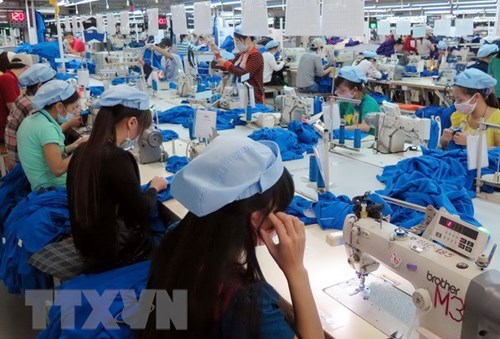The information was heard at the seminar “Prospects for textile and garment export in 2019” held in Hanoi on September 20 as part of the Vietnam Hanoi Textile & Garment Industry Expo (HanoiTex) 2018.
Experts said that Industry 4.0 will have huge impact on Vietnam’s sector, forcing it to shake up and make heavy investments in both equipment and human resources.
    |
 |
|
2019 will be a challenging year for Vietnam’s textile and garment industry. |
Now, thorny problems for the garment and textile enterprises are not only number and value of orders and growth pace, but also technological innovation and human resources training.
According to economist Le Dang Doanh, made-in-Vietnam garment and textile products are facing fierce competition from those in Bangladesh, Cambodia, Laos, Sri Lanka and Myanmar.
He suggested local firms to enhance competitive edge to grasp opportunities and gain foothold in the fluctuating market.
A representative from the Ministry of Industry and Trade said that the Vietnamese economy has attained significant achievements during the international integration, with stable economic growth and favorable business climate, to which the garment and textile sector has made significant contributions.
Last year, the sector earned more than USD 31 billion in export revenue, up 10 percent from 2016. In the first eight month of 2018, Vietnam exported USD 23 billion worth of clothing products, a year-on-year surge of 15 percent. Export revenue for the whole year is forecast at USD 35 billion.
The HanoiTex 2018, which opened in the capital city on September 19 and runs until September 21, help firms learn about new technologies, thus increasing the rate of locally-made materials and meeting foreign clients’ demand. Also, it provides a platform for businesses in the field of finance, investment, manufacturing to meet partners, expand markets and work out long-term business strategies.
Co-hosted by the Hong Kong’s CP Exhibition Company and the Vietnam National Textile and Garment Group, the event lured 120 exhibitors from China, Germany, Japan, the Republic of Korea, Pakistan, Taiwan (China), Thailand and Vietnam on a site of over 6,000 sq.m.
On display are patterned, dyed, high-tech and micro-fiber fabrics, anti-dry weaving materials, and machinery used in sewing, weaving, embroidery, dyeing chemicals and many other materials.
On the sidelines of the event, seminars on building fiber – textile – weaving connectivity chain and improving workforce quality in the field to meet demand of the Fourth Industrial Revolution will also be held.
Source: VNA